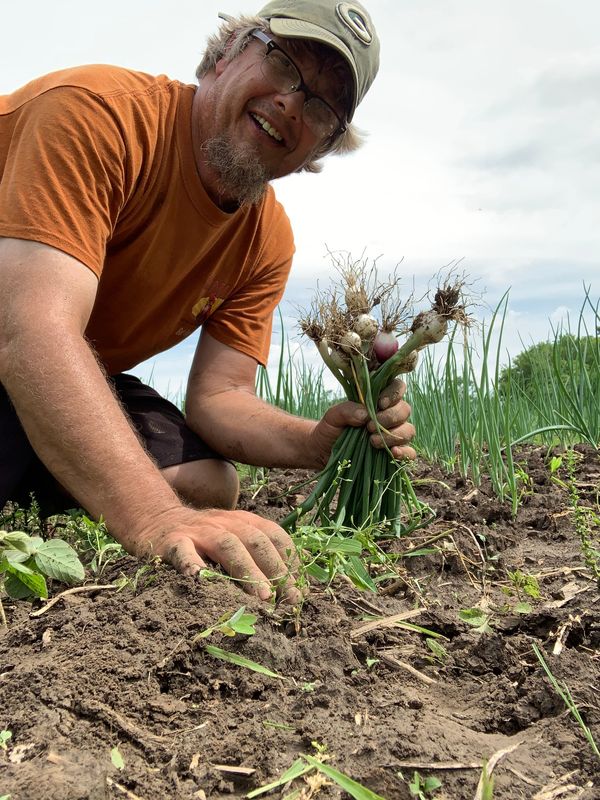Rick Slager, owner of Produce with a Purpose in Kaukauna, grew up growing food. He would sit with his father, Don, every year and pick out seeds to be used at the family farm.

That love of growing produce remained with him as he pursued his first business, Slager Lawn and Landscape, a business that he operated from 1997 to 2010. Then, what he describes as a midlife crisis, struck.
Slager said, “I wanted to do something else. I thought of doing mission work in Africa; I had spent time in West Africa years earlier and was contemplating working with small farmers and helping them in the agricultural sector. But my kids were still young, and I didn’t think it would be a good thing to spend a lot of time overseas.”
He also felt the pressure of working with a group of Africans who were living on as little as $1 a day and were looking to him for answers.
“I thought that I should start a farm myself and learn how to market what I was producing,” he said. “Marketing was my major; I was confident that I would able to build a business and support African farmers.”
He and his wife, Dawn, and their two children moved to a farm near Fond du Lac. Initially, they grew their crops on half an acre. But, acre by acre, the farm expanded. Additional land was leased and it turned into a larger operation of about 20 acres.
They grew a mix of vegetables including potatoes, carrots, beets, parsnips, storage crops, and root vegetables that could be stored and sold all winter. Slager said he took pride in the fact that he could sell a carrot in March that had been harvested in October.
In 2011, he began to sell at the Fond du Lac Farmers Market, and the following year, added another market that was held nearby. He named the business and formed an LLC.
“The name, Produce with a Purpose, was based on our purpose,” Slager said. “We were working with West African farmers and sent some of the proceeds of our sales to Africa to help them buy seeds. I was trying to bring awareness to the plight of rural African farmers and the struggles they have. It is still on my heart today.”
Locally, he noted, he wanted to provide the community with better options for fresh food and an understanding of what it takes to produce it.
The business continued to evolve and the next step took root in 2012 when a decision was made to develop a community-supported agriculture program where customers could subscribe to receive a box of fresh produce on a regular basis. He promoted it on social media and quickly developed a following. But after several years he felt the need to modify the program.
Slager said, “When I was talking to customers, they said they had too much of this and too little of something else. In 2016, we started a thing called Build a Box. We said we’d give them a customized box at a flat rate of $20. That idea resonated so much with the public that we couldn’t keep up with the demand.”
That continued until the pandemic hit and he said that demand “exploded.” Soon, he was running four routes because people weren’t as free to go visit a grocery store. The increase in sales lasted for several years until the world began to open back up, and when it did, the delivery service suffered.
Slager needed new ideas to keep the business going. He went back to focusing on the subscription service and pursued other avenues for growth. The hard work of farming was taking a toll on his body and he and Dawn began to outline a different direction. They made the difficult decision to sell the farm and pursue a wholesale and retail produce business.
The business model was revamped and offerings were expanded. In addition to the subscription boxes, they developed sources for fresh produce to sell. They leased space at Revolution Market in Ashwaubenon where they sold items that were purchased from small farms and other producers.
The couple continued to tweak their business model, and as demand grew, decided to leave that location and expand to a 26,000-square-foot warehouse in Kaukauna.
“It’s about 30 minutes or less from everybody,” Slager said. “It is a good location and there is much future development in the area. It is kind of a food desert and we are providing a convenient place where people can park right next to the building and come in.”
The building has a small commercial kitchen and retail shop. Every Saturday, there is a popup market with six to 10 vendors added to the mix. Slager, in addition to featuring a wide selection of produce, sells ready-to-eat meals and says he has the area’s best Cornish pasties. The kitchen is also busy making grilled cheese sandwiches and a changing variety of unique foods.
The subscription boxes continue and Dawn is often behind the scenes filling more than 60 boxes and doing stocking. Her husband’s roles include everything operational from sourcing produce to making ready-to-eat meals.
“I am also the marketing guy. I know who my customer is, what they want, and when they want it. Fifteen years of experience tells me that they will want squash in the fall, but after Thanksgiving, they will be on to the next thing,” Slager said.
During the growing season, food is sourced more locally. The rest of the year, he looks for items that are fresh but not always easy to find. All of this takes time and he estimates that he works 70 to 80 hours a week as he continues with a work ethic that began as a youngster on the family dairy farm.
The business and development of what he wants Produce with a Purpose to be changes often as he tries to find the right business model. He hasn’t written a business plan, but says he would encourage other startups to do so. At the current time, he has several experienced business mentors who are providing guidance.
“I’ve gotten some great ideas from them,” he said. “I was throwing things at the wall to see what stuck. Now I am finding out what is best from the mentors on the board that I created. I had been doing wholesale, but we decided that was too time-consuming. Now I am focusing on the retail aspect.”
A favorite part of that is educating people on how food is grown and the benefits of the various products. He is also writing a book, “How Not to Farm.”
“You really have to understand the complexity of growing food. It isn’t some easy thing,” Slager said.
For others thinking of starting a similar business, he suggests working with someone for a year to get practical experience. His other advice is to be cautious before expanding and not put the cart before the horse. If he had it to do over, he would be more cautious.
He added, “If someone asked, I would tell them to know what they are getting into. I would help them to avoid some of the mistakes I made. I would say they should do it, but make sure they can follow through. Farming isn’t easy; it’s hot and sweaty and dirty and rainy.”
Despite that, as he gets ready to open for another day, he can look around and bask in his achievements and in how far he has come since selling at the farmer’s market.
“I try to corral this wild cowboy. I never thought I’d be where I am today. I feel like I’m innovative and always looking for the new, next thing,” he said. “I’m kind of a cutting-edge type of guy.”
Tina Dettman-Bielefeldt is co-owner of DB Commercial Real Estate in Green Bay and past district director for SCORE, Wisconsin.
This article originally appeared on Green Bay Press-Gazette: Business owner Rick Slager offers fresh Produce with a Purpose in Kaukauna
Reporting by Tina Dettman-Bielefeldt / Green Bay Press-Gazette
USA TODAY Network via Reuters Connect


